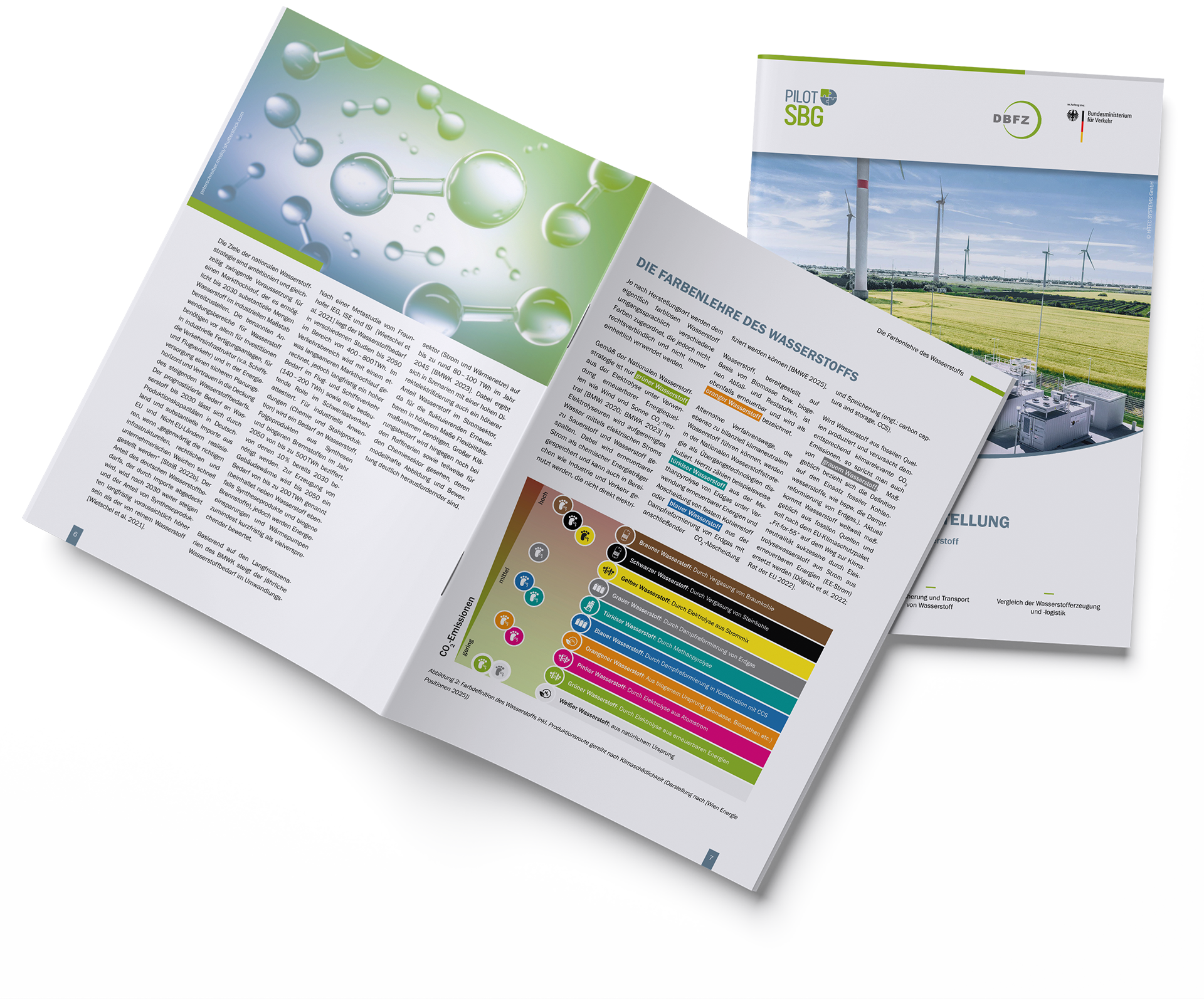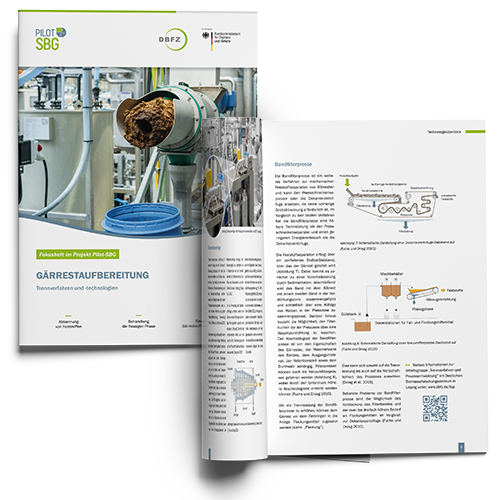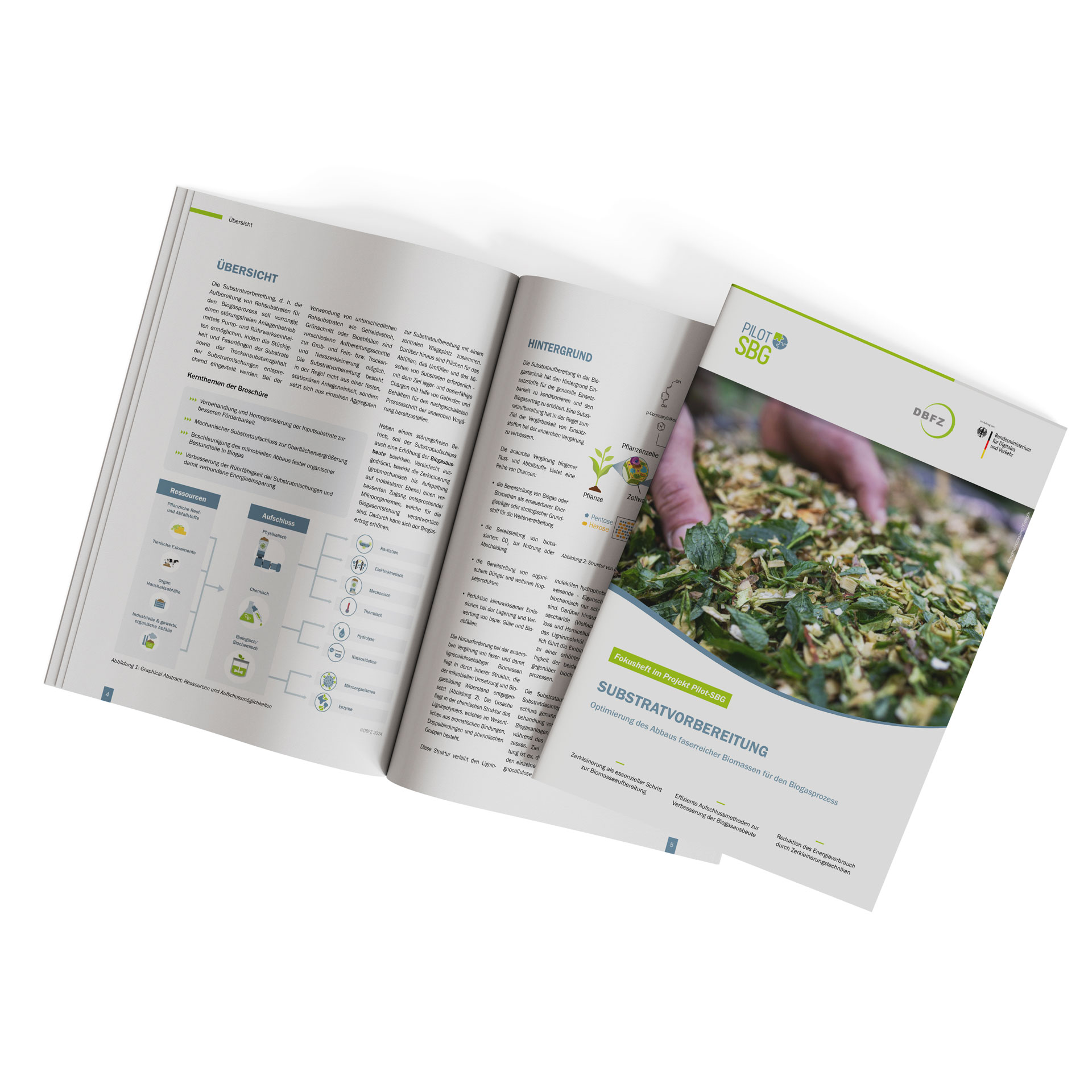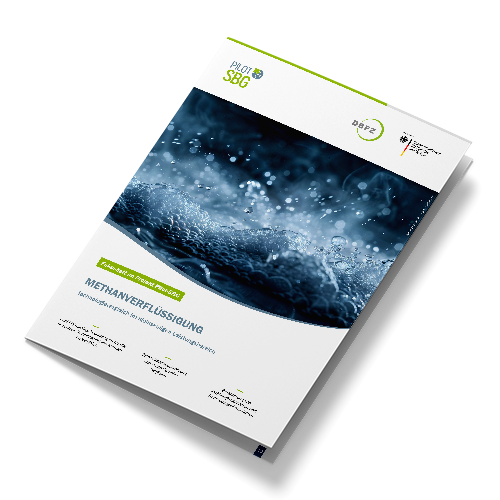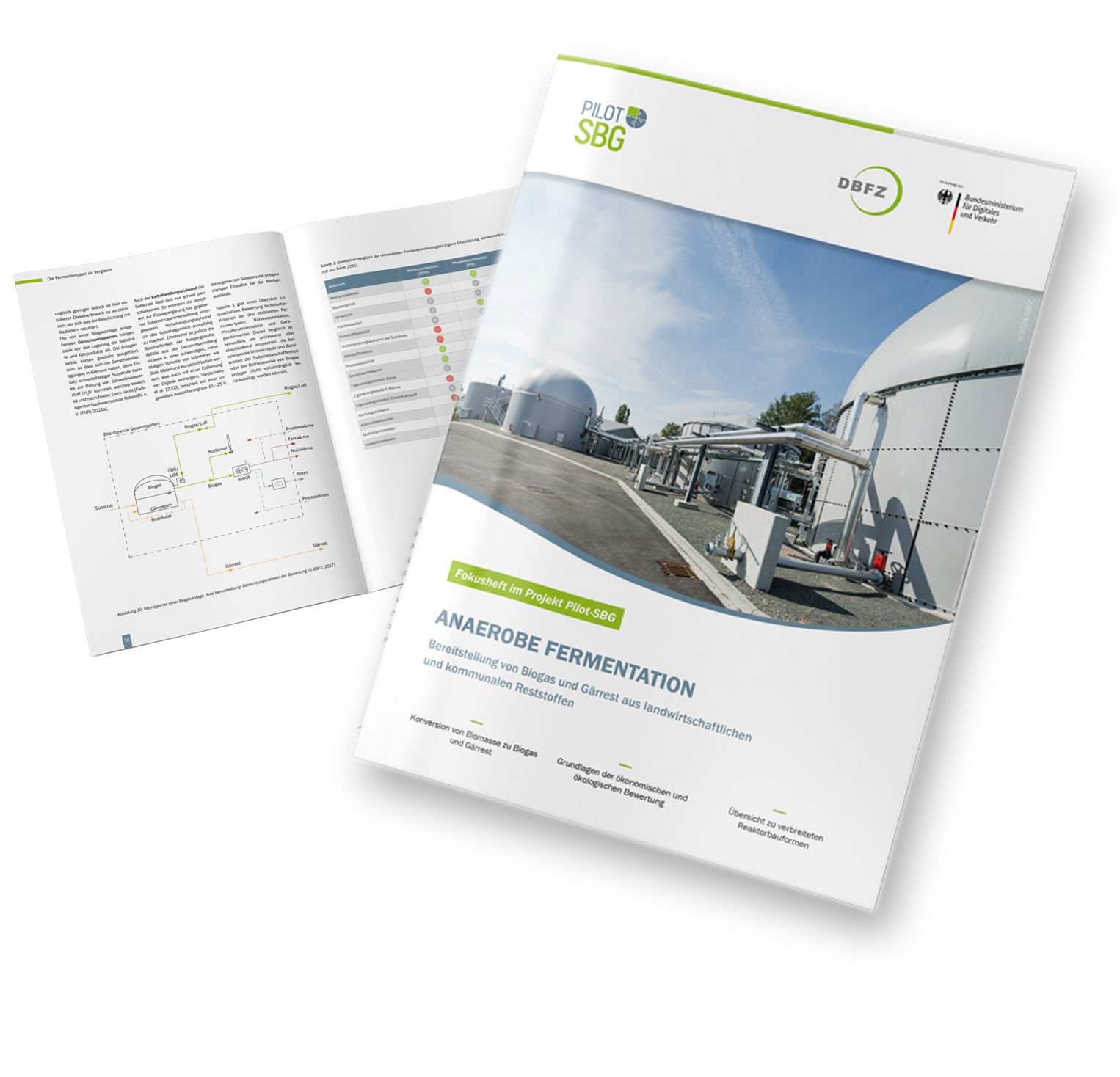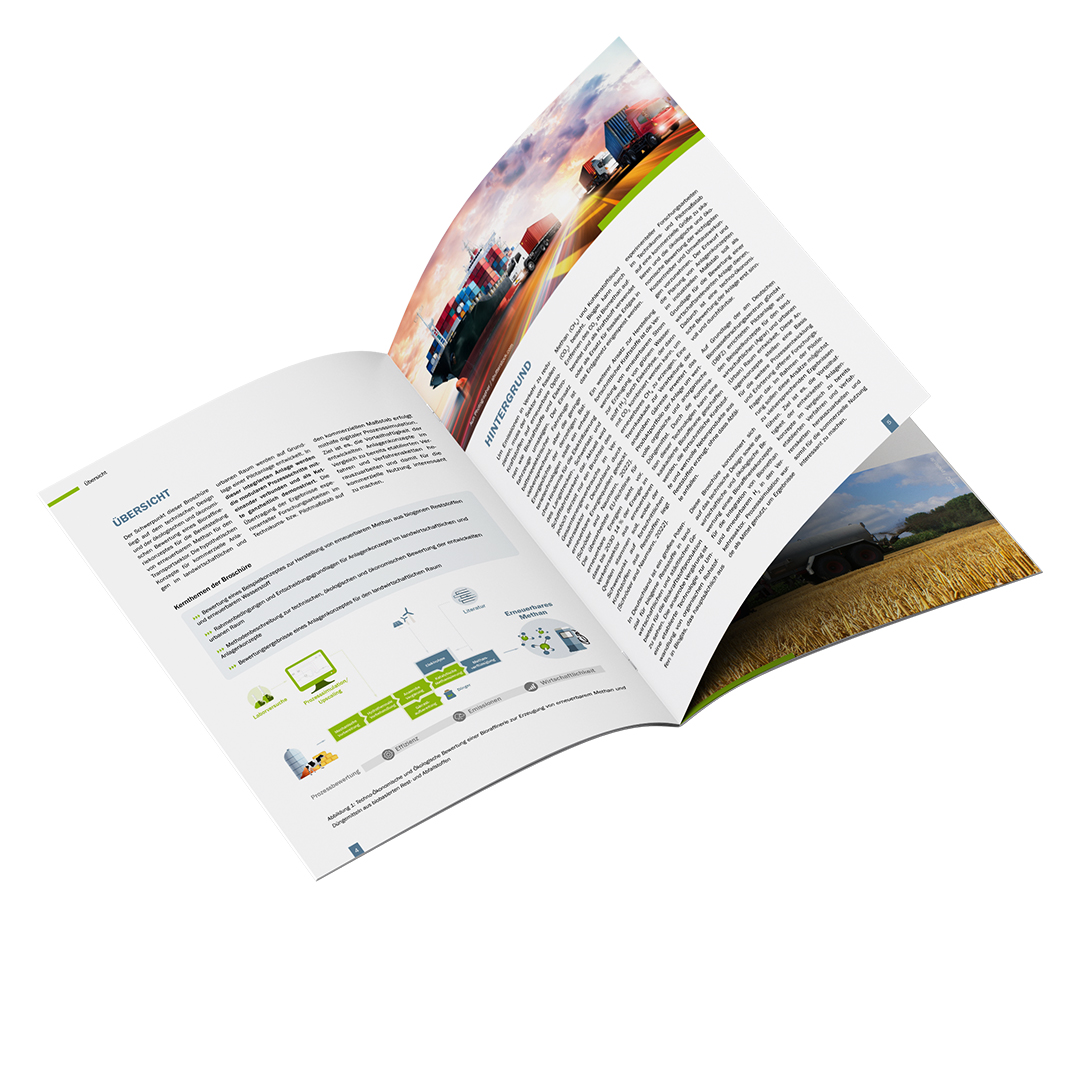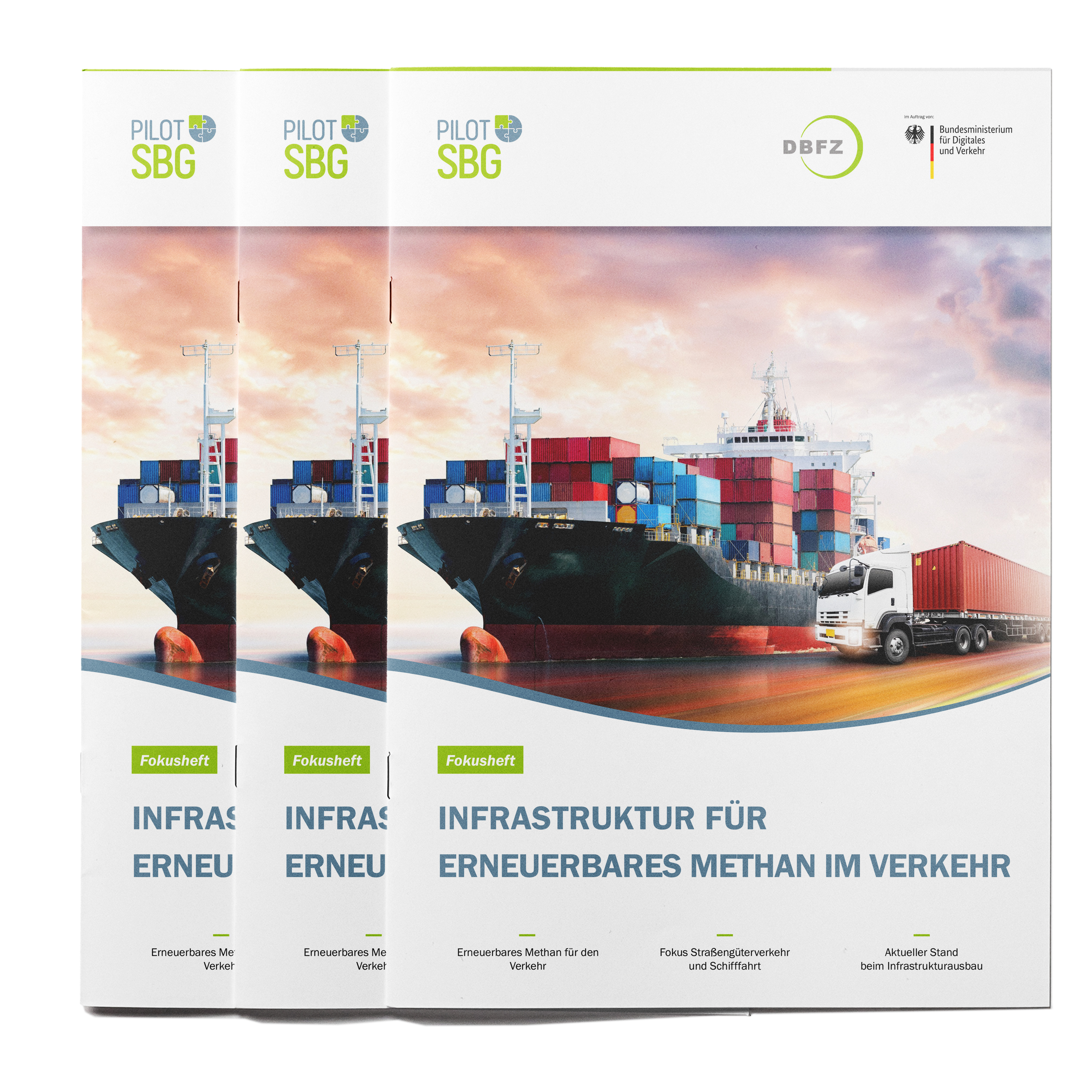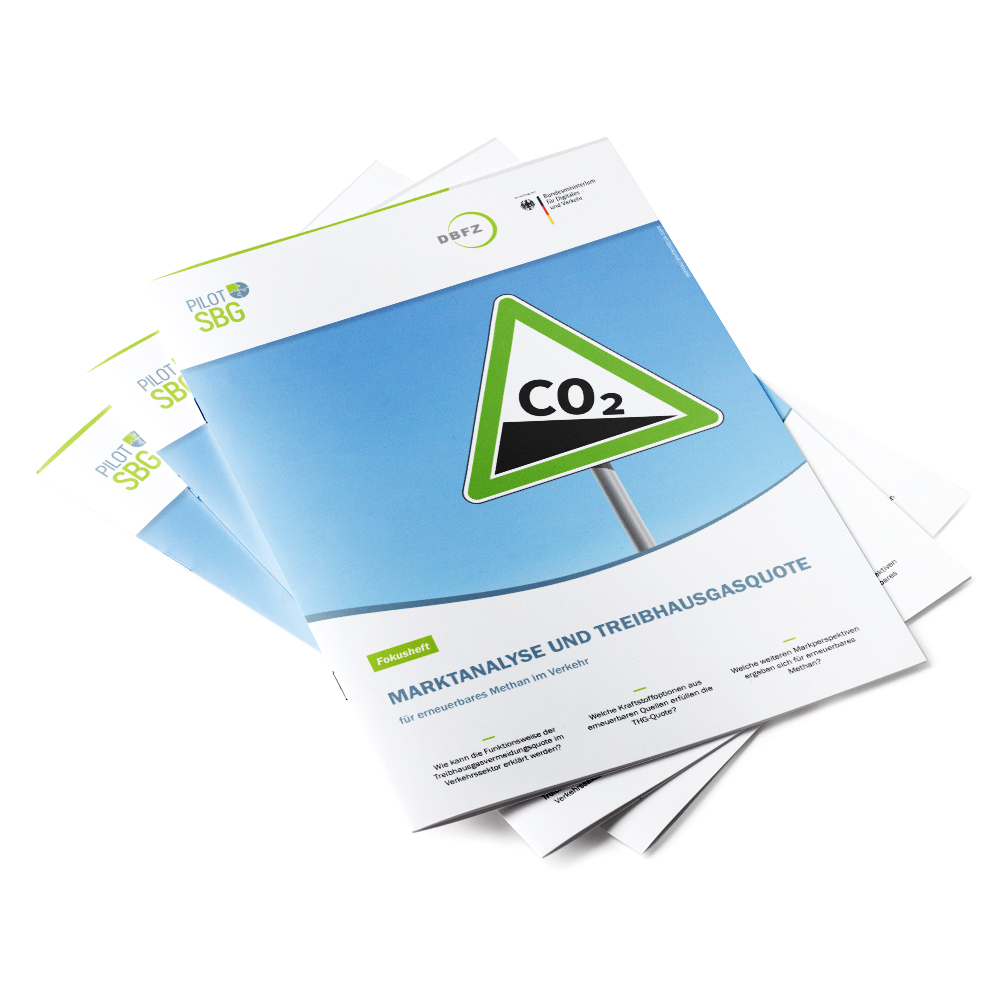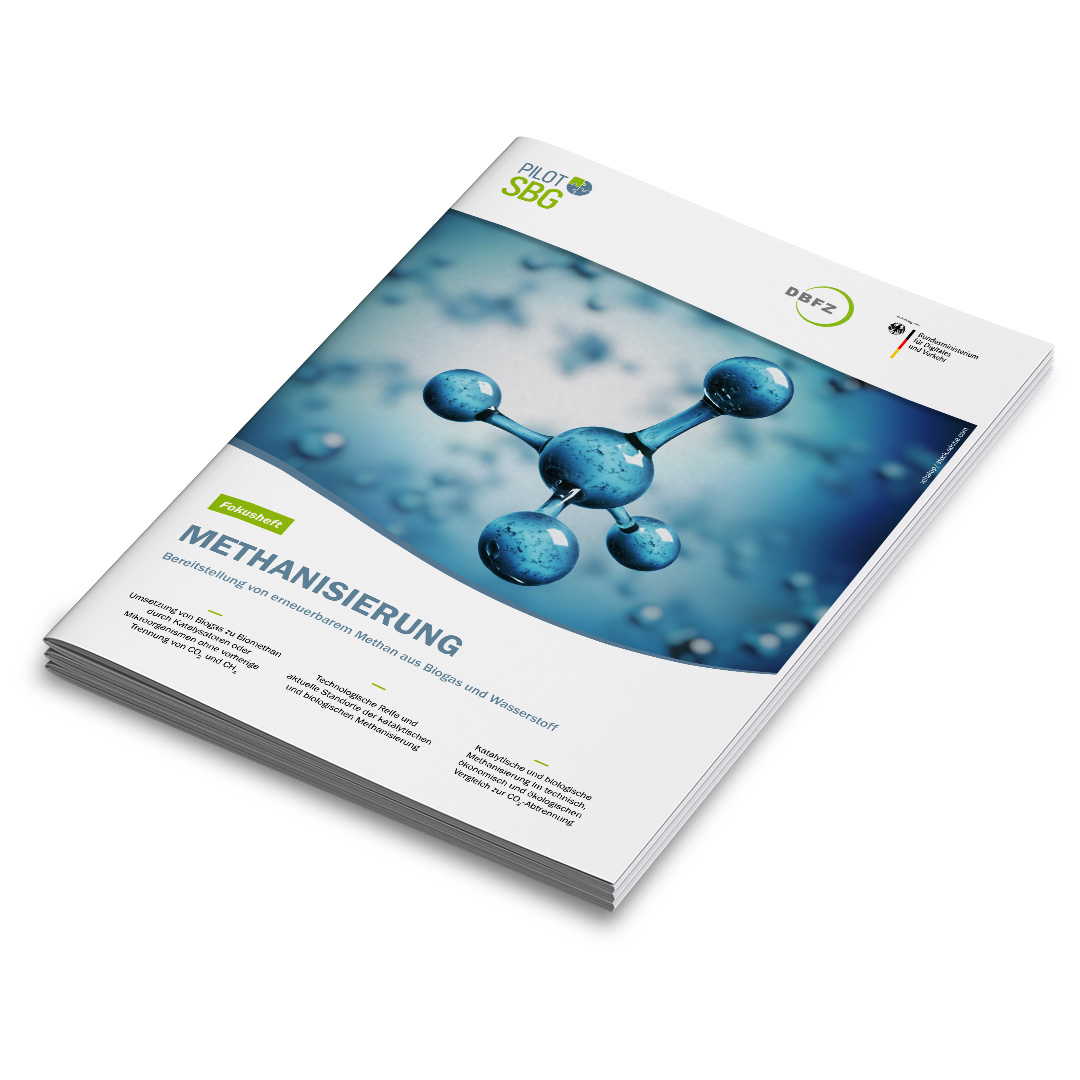Focus booklets
Hydrogen supply
Production and logistics of green hydrogen
This focus booklet deals with the role of hydrogen in the energy transition and its various possible applications. It discusses the challenges and opportunities associated with the production, transport, and use of hydrogen as a clean energy source. The use of green hydrogen is intended to enable a reduction in CO2 emissions and the achievement of climate neutrality.
» Download: Focus booklet Hydrogen supply [German version]
Recommended citation: Dietrich, S.; Etzold, H.; Oehmichen, K.; Naumann, N. (2025). Wasserstoffbereitstellung | Erzeugung und Logistik von grünem Wasserstoff. Fokusheft im Projekt Pilot-SBG. Leipzig: DBFZ. 51 S. ISBN: 978-3-949807-34-3. DOI: 10.48480/aqdq-gr59.
Digestate treatment
Separation processes and technologies
The focus booklet ‘Digestate treatment - separation processes and technologies’ provides a comprehensive overview of current processes for treating digestate from biogas plants. It presents technical solutions for the mechanical separation of solids, the treatment of the liquid phase and innovative hydrothermal processes and evaluates these on the basis of technical and economic criteria. The focus booklet offers practical decision-making aids for selecting suitable process combinations in order to recover nutrients in a targeted manner, reduce transport costs and fulfil legal requirements efficiently.
» Download: Focus booklet 'Digestate treatment' [German version]
Zitierempfehlung: Nitzsche, R.; Yuan, B.; Costa de Paiva, G.; Knötig, P.; Klüpfel, C.; Herklotz, B.; Braune, M. (2025). Gärrestaufbereitung: Trennverfahren und -technologien. Fokusheft im Projekt Pilot-SBG. Leipzig: DBFZ. 37 S. ISBN: 978-3-949807-28-2. DOI: 10.48480/jzrf-tw08.
Substrate preparation
Optimizing the degradation of high-fibre biomass for the biogas process
The focus booklet deals with the optimization of the degradation of fiber-rich biomass for the biogas process and describes various pre-treatment methods, including mechanical, thermal and chemical technologies. These processes are evaluated on the basis of specific parameters, including energy consumption, investment costs, methane yield, substrate throughput and gas yield. The advantages and disadvantages of the processes are also considered: Mechanical shredding increases biogas production, but has high energy requirements. Thermal processes are cost-intensive, while chemical processes cause the risk of inhibitors. This analysis supports the selection of suitable technologies for the efficient operation of biogas plants.
» Download: Focus booklet substrate preparation [German version]
Recommended citation: Fischer, E.; Verworner, B.; Zerback, T.; (2024). Substratvorbereitung - Optimierung des Abbaus faserreicher Biomassen für den Biogasprozess. Fokusheft im Projekt Pilot-SBG. Leipzig: DBFZ. 27 S. ISBN: 978-3-949807-17-6 . DOI: 10.48480/9q7a-py77 .
Methane liquefaction
Technology comparison in the small-scale performance range
The focus booklet examines the use of small-scale, decentralised liquefaction plants to improve the availability of biomethane in the transport sector. It compares different technologies in terms of costs, efficiency and ecological aspects and highlights the individual requirements for each location.
» Download: Focus booklet Anaerobic fermentation [German version]
Recommended citation: Etzold, H.; Nitzsche, R.; Oehmichen, K.; Schröder, J. (2024). Methanverflüssigung - Technologievergleich im kleinskaligen Leistungsbereich. Fokusheft im Projekt Pilot-SBG. Leipzig: DBFZ. 29 S. ISBN: 978-3-949807-11-4 . DOI: 10.48480/bh9h-am62.
Anaerobic fermentation
Provision of biogas and digestate from agricultural and municipal residues
A central technology of the pilot plant for renewable methane is biogas production through anaerobic fermentation. The new focus booklet "Anaerobic fermentation | Provision of biogas and digestate from agricultural and municipal residues" offers a compact insight into the conversion of biomass into biogas and digestate. Various reactor concepts are presented and categorised in terms of efficiency, sustainability and cost-effectiveness.
» Download: Focus booklet Anaerobic fermentation [German version]
Recommended citation: Pohl, M.; Stur, M.; Oehmichen, K.; Etzold, H. (2024). Anaerobe Fermentation: Bereitstellung von Biogas und Gärrest aus landwirtschaftlichen und kommunalen Reststoffen. Fokusheft im Projekt Pilot-SBG. Leipzig: DBFZ. 27 S. ISBN: 978-3-949807-09-1. DOI: 10.48480/b9vn-9686.
Example concept
for the provision of renewable LNG from biogenic residual and waste materials and renewable hydrogen on a commercial scale
Switching from fossil fuels to renewable energies such as biofuels and electric vehicles is crucial to reduce transportation emissions. Although battery electric vehicles are promising, the low energy density of current battery technologies is an obstacle to the electrification of long-distance, heavy-duty and shipping transportation. In Germany, the use of biogenic residues offers significant potential for the production of biofuels, whether through the established technology of anaerobic digestion or the innovative approach of producing advanced fuels using renewable electricity and electrolysis. Focusing on technical design and economic-ecological assessment, this focus issue transfers research results from pilot scale to commercial scale through process simulation. The design of industrial plant concepts forms the basis for the evaluation of a relevant commercial plant.
Recommended citation: Röder, L. S.; Nitzsche, R.; Etzold, H.; Oehmichen, K. (2024). Beispielkonzept zur Bereitstellung von erneuerbarem LNG aus biogenen Rest- und Abfallstoffen und erneuerbarem Wasserstoff im kommerziellen Maßstab: Fokusheft im Projekt Pilot-SBG. Leipzig: DBFZ. 31 S. ISBN: 978-3-949807-06-0. DOI: 10.48480/jsct-z879.
Infrastructure for renewable methane in transport
The expansion of an infrastructure for renewable LNG has already begun in the transport sector. In recent years, numerous LNG filling stations have been built along the most important European transport routes and refueling facilities for ships. However, these are currently mainly supplied with fossil LNG, as the expansion of liquefaction capacities for renewable methane has not progressed to the same extent. The focus booklet shows the current status of the development of an infrastructure for renewable LNG for road freight transport and shipping as well as the associated challenges in dealing with the greenhouse gas methane and the sensitivity of the LNG filling station price using the example of road freight transport.
» Download: Focus booklet Infrastructure for renewable methane in transpor [German Version]
Recommended citation: Schröder, Jörg; Hauschild, Stephanie; Naumann, Karin (2023): Infrastruktur für erneuerbares Methan im Verkehr, Fokusheft im Projekt Pilot-SBG
Market analysis and greenhouse gas quota
for renewable methane in transportation
The focus booklet provides an overview of the greenhouse gas avoidance quota (GHG quota) in Germany. In the model presented, the compliance options described are ranked according to the lowest specific abatement costs. The determined ranking leads to a merit order, from which the composition of the GHG quota can be derived. Conclusions can be drawn for individual fuel options, e.g. renewable methane. In addition, further market prospects for biomethane in other areas of application are identified and decisive factors for market implementation are named.
» Download: Focus booklet Market analysis and greenhouse gas quota [German Version]
Recommended citation: Dögnitz, Niels; Etzold, Hendrik; Naumann, Karin (2023): Marktanalyse und Treibhausgasquote für erneuerbares Methan im Verkehr, Fokusheft im Projekt Pilot-SBG
Methanation
Provision of renewable methane from biogas and hydrogen
This focus booklet provides an insight into the process of methanation, which can be used, for example, to upgrade biogas to biomethane. Catalytic and biological methanation are described in detail and compared technically, economically and ecologically. CO2 capture from biogas, which is currently used as the standard technology for biogas upgrading, serves as a reference for the evaluation. In contrast to CO2 capture, methanation offers the possibility of using almost the entire available carbon of the carbon source (e.g. biomass) for energy and material purposes. The focus booklet lists sites where the technical feasibility of methanation technologies has already been demonstrated. It also discusses the conditions under which catalytic or biological methanation is more suitable.
» Download: Focus booklet Methanation [German Version]
Recommended citation: Nieß, Selina; Dietrich, Sebastian; Klemm, Marco; Etzold, Hendrik; Oehmichen, Katja (2023): Methanisierung | Bereitstellung von erneuerbarem Methan aus Biogas und Wasserstoff, Fokusheft im Projekt Pilot-SBG
